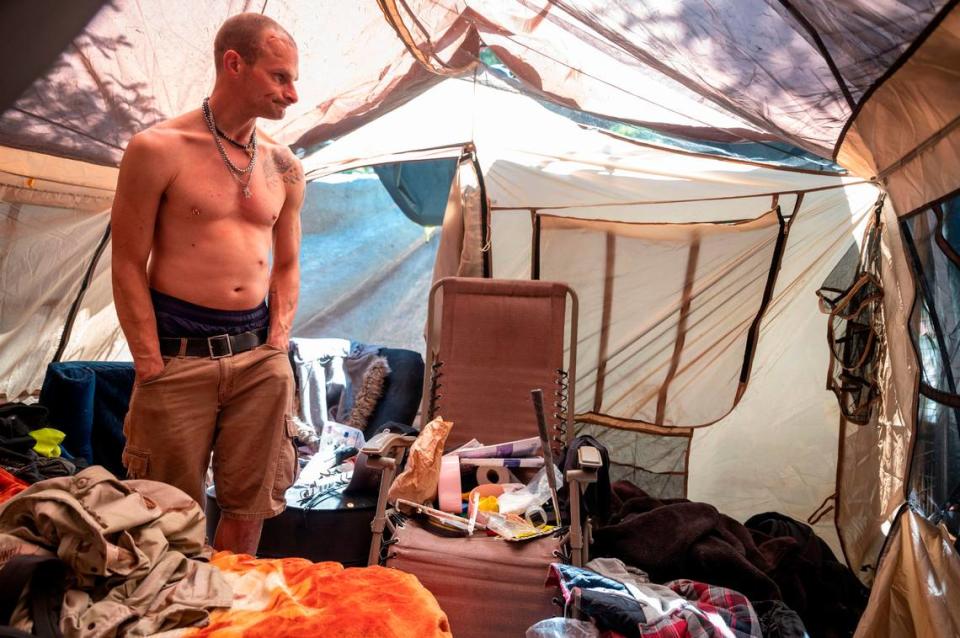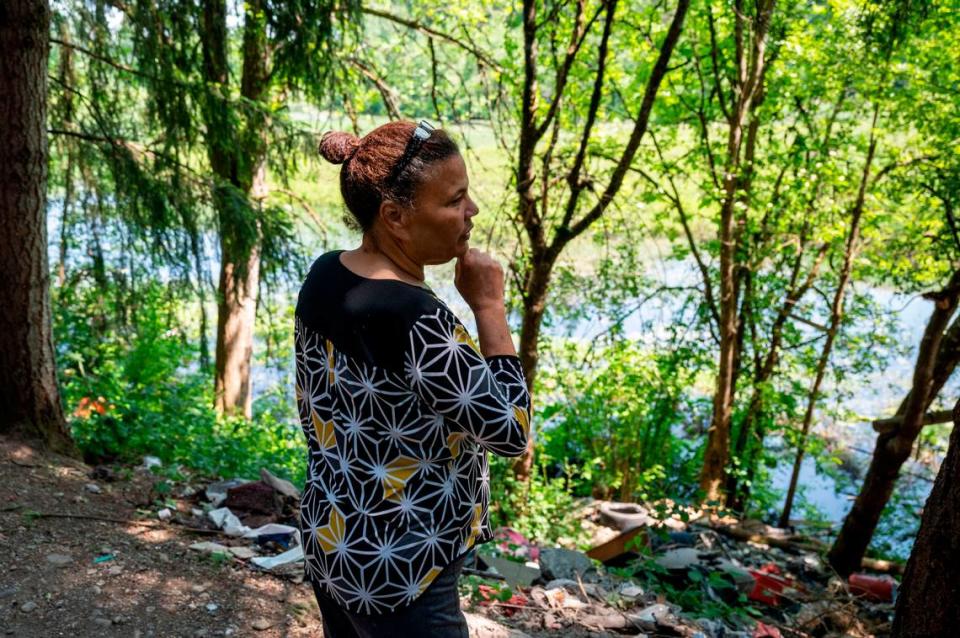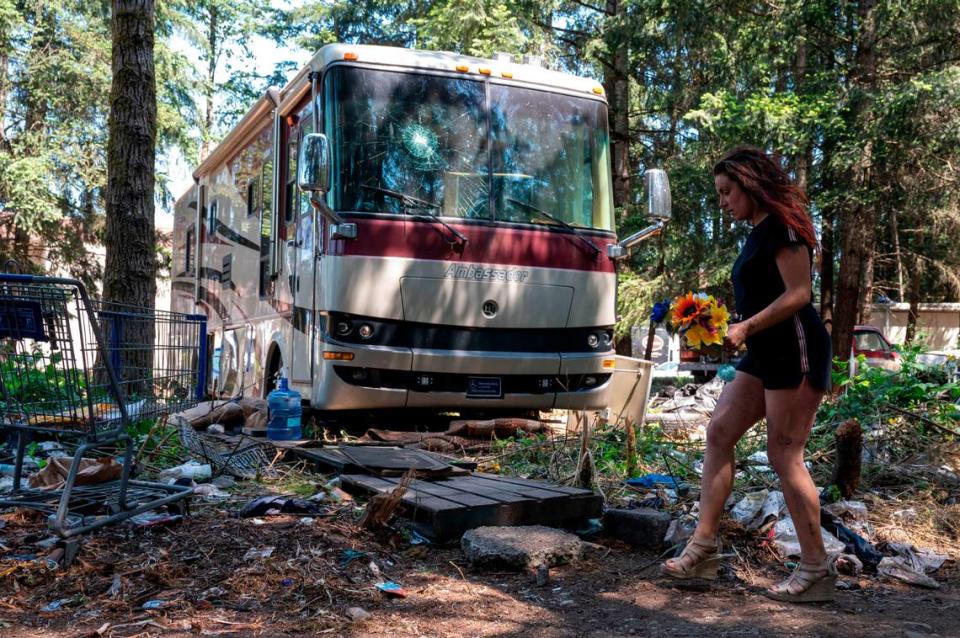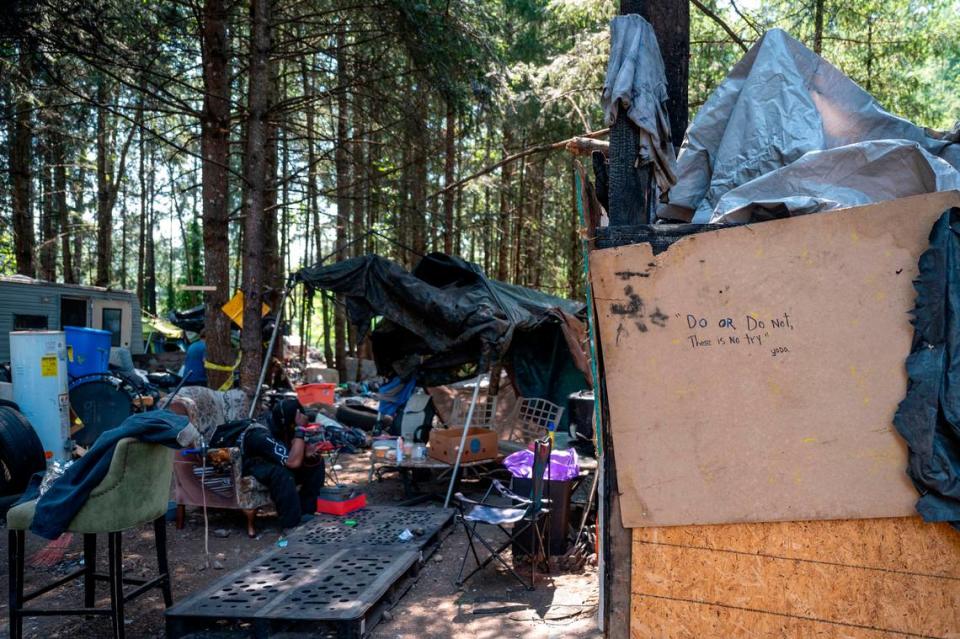They call ‘The Jungle’ home. Soon they’ll be forced to move out of the Tacoma encampment
Outside a 7-Eleven deep in Tacoma’s South End, Bouviea Aaron leaned over an empty yellow newspaper stand and recalled a childhood camping trip to a site with designated parking for RVs and showers — nothing like how it is down the block.
For the past four months, Aaron, 65, has navigated a new world outdoors a quarter-mile away from the convenience store, sleeping in an old Ford F-150 topped with a slightly ill-fitting truck canopy she bought for $100 from a neighbor in “The Jungle” — an oft-used nickname for the homeless encampment on private land where Aaron now lives.
An estimated 30 people experiencing homelessness call the makeshift community near Charlton Lake home on any given day — some who’ve lived there for years, according to Aaron. It’s a patchwork of RVs, worn-down vehicles, plywood boards, tents, tarps and scattered debris that peek behind layers of thin trees in a shallow wooded area close enough to Steele Street that one can hear the swooshing of traffic.
In the encampment, adjacent to a senior-living facility, Aaron has donned various hats: kitchen staff when others want cereal; the fire department when flames require extinguishing; and a medic when someone asks for bandages or needs an injection of life-saving Narcan to reverse an opioid overdose.
She’s been anointed a “celestial mother” by one dweller, and she’s the real mother to a 43-year-old son, who regularly visits from just across the lake, where he lives in a homeless congregation on a mini-island that Aaron is afraid to go to.
“Most of us, including myself, we don’t see a positive end in sight,” she said.
Their dire situation is likely to be further complicated come Tuesday when the camp is slated for removal, marking the second abatement of the encampment in the past year, following one last June and raising fears among campers that they’ll have nowhere else to go.
The city of Tacoma has received 24 citizen requests through its 311 reporting system in the past year regarding the encampment, according to city spokesperson Maria Lee. Those include requests related to code compliance, police assistance, debris, garbage removal and outreach.
After a citizen’s complaint about “The Jungle” in March, the city inspected the site the same day and soon after notified the property owner, Steele Street Holdings LLC, that it was in violation of Tacoma’s nuisance code, city code enforcement officer Ken Ketter said in a recent interview.
Steele Street Holdings, which Pierce County property records show bought the 2.8-acre plot in February, has since authorized the city to assist in the upcoming abatement, according to Lee. The city has completed 22 camp abatements already this year, nine of which were on private property, she said.
Steele Street Holdings did not return messages seeking comment for this story.
In an emailed response to several questions from The News Tribune, Lee said that encampment members have been offered “all available shelter options” and city-contracted outreach teams have visited the site twice weekly on average over the last year.

Residents of the camp, including Aaron, feel as though they’re being cheated out of housing opportunities, specifically motel rooms that they say were offered to members of recently swept encampments nearby.
“If we get out of here, where we gonna go?” said Kelsi Springs, 34, who arrived at the encampment a year ago due to what she referred to as a bad relationship. “We’re just gonna be on the sidewalk?”
Lee said that Tacoma has consistently offered the same resources to members of all encampments within the city’s jurisdiction. She noted that the state Department of Commerce has provided funding, including for hotel rooms in some instances, for people whose abated encampments were close to “The Jungle” but fell within the Washington Department of Transportation’s right of way.
In late May, when The News Tribune toured Aaron’s encampment just north of the unincorporated Pierce County border, some appeared resigned to the fact that they could soon be pushed out elsewhere. “Where?” was a question, however, without an immediate answer.
“I’m just not thinking about me,” J.R. Marquez said. “I’m thinking about everybody else, too. And it’s kind of hard.”
Homelessness rising
In Pierce County and in many places across the United States, the homelessness problem is exacerbated by an affordable housing crisis for the lowest-income residents. Lack of housing supply is driving up costs, and government funding is inadequate to meet demands.
Rob Huff, a spokesperson for Tacoma Pierce County Coalition to End Homelessness, said that people are falling into homelessness at a quicker rate than people are getting off the streets or out of shelters despite local efforts to address the issue.
“Ultimately, housing is at the heart of homelessness,” Huff said in an interview. “If we don’t have places that people can move into, it makes it really hard to make a dent in the number of people who are living outside.”
This year’s annual Point-in-Time operation — a one-day, volunteer-driven and inexact calculation of people experiencing homelessness in the county — provides a glimpse into how hard progress can be. There were more people tallied than during any other count in the past 15 years, according to data from the county and Department of Housing and Urban Development.
There are certain caveats to comparing historical figures in the annual tally, including the need to take into account changing methodologies or shifting numbers of volunteers from year to year. Still, “it’s pretty clear that there’s been an upward trend,” Huff said.
Some 2,100 people were counted in shelters and on the streets during the Jan. 26 operation, but roughly 6,500 people are connected to county homeless services, according to the county. The significant undercount reflects the difficulty of reaching every unsheltered individual spread out across a large county.
Compounding issues
Springs came to “The Jungle” because of relationship issues. Marquez, 48, said he contracted COVID-19, ended up in the hospital for eight months and lost a job. Alanna Martin, 43, was fired from a housekeeper- and nanny-type position, lived out of her car for a few months and turned to the wooded refuge four years ago.
For Aaron, it was a recent turn in her life.
She was raised in Bonney Lake as the only girl of four children. One brother died in a house fire. A marriage to a man in the military didn’t last. She worked a variety of odd jobs, such as truck driver, care provider and factory worker.
In 2010, Aaron was electrocuted while on the clock as a contractor at a shipyard, she said. Electricity coursed through her body as she held a piece of metal pipe at the request of a colleague who wanted to weld a bracket onto it.
“It just zapped me pretty darn good,” she said.
Forced into an early retirement, she went on welfare and now collects slightly more than $900 monthly in Social Security. Until late last year, she lived at a mobile home park in Roy, a rural community south of Joint Base Lewis-McChord.
When a new owner bought the park, evictions soon followed over alleged violations of rental agreements, including with regard to rent, unauthorized pets and property junk. Aaron’s case was just one of 10 initiated by Little Lake LLC when The News Tribune reported on the mass exodus in September.

Aaron, who is a federal housing voucher recipient, disputed she’d violated her agreement. A pro-bono attorney fought for her in a case that court records show is still ongoing. Aaron left the trailer. A November legal filing on her behalf indicated that she had been forced since October to stay with friends and family because the home had become condemned.
When interviewed about her precarious housing situation late last summer, Aaron predicted her fate: “I’m going to be in a tent on the side of the street in just a matter of a few days.”
Aaron’s premonition about the prospect of finding affordable housing rang true. Aaron said she’s diligently searching for options, and organizations have stepped in to help, but nothing has come to fruition and she’s unwilling to move into something she deems less safe than her current circumstances.

Her situation has been made more complex by a move she thought she’d be making prior to relocating into “The Jungle.” After departing her home in the Roy, she briefly stayed with a neighbor in the mobile home park and then got a bead on a trailer in King County. So she transferred her Section 8 voucher from a housing authority in Pierce County to King County, a process she said took roughly a month.
That trailer move-in fell through. Now Aaron faces a quick-approaching deadline.
In general terms, whenever a voucher isn’t being used, a countdown clock begins. A recipient has 120 days — with a 30-day extension granted in some instances — to find a new place before they lose the voucher. They aren’t easy to come by. The Pierce County Housing Authority has 3,000 vouchers and an estimated 10,000 people on a waiting list hoping to win one in a lottery, according to executive director Jim Stretz.
The demand is so high that the waiting list hasn’t been opened since 2018, Stretz told The News Tribune.
Aaron said she was granted a 30-day extension. It means she has until the end of this month to find a place to stay or else she’ll lose her voucher.
“I’m in the woods right now,” she said. “Of course, I want some place to live.”

Dangers but camaraderie, too
Aaron never envisioned that her home would be where it is now, but the location wasn’t unfamiliar to her. When moving out of the Roy mobile home park, she said she hired a man off the street to help her pack. He lived in “The Jungle,” and Aaron said she visited to bring soups, sandwiches and other food.
She has come to learn that the place, which can smell like campfire from either cooking or the burning of trash or wood, is one where it’s smart to be mindful. Neighbors have peeked through the windows of her pick-up truck, with their hands around their eyes to get a better view of what’s inside.
“It is what it is,” she said. “It’s the weirdest situation in the world. It’s really odd. You worry about the mass marauders.”
Springs said people who can afford service often have cell phones stolen or broken. Those who’ve lived in the camp longer have faced grave dangers: Brandon Jermaine Lee Booker, also known as “Bullet,” recalled being hospitalized after being attacked in his sleep; Martin said she was choked unconscious, dragged down a hill and assaulted.
Bob Chapman, executive director of Charlton Place, the adjacent assisted-living home, said that there have been issues with people from “The Jungle” walking onto Charlton Place’s property or starting fires in the encampment.
“It’s just a nuisance,” he told The News Tribune. “It’s just unsightly.”
Others have taken notice.
A citizen complaint to the city in May noted that the encampment was causing a health-and-safety issue, with “garbage, junk, abandoned vehicles and tents being constructed on public sidewalks,” according to details of the complaint shared by the city.

Two months earlier, a resident was far more aggressive when they called the city and delivered an “ultimatum” about the encampment, according to the city’s note of the complaint.
“Caller stated that the neighbor(hood) will gather together and will take care of this homeless and you will find bodies laying around,” the note said. “Caller hung up and could not take a name.”
Residents of the camp acknowledged that there were underlying issues that complicated the situations of people living in the encampment: mental and physical health, substance abuse and more.
Lee said the city commonly refers people to options for behavioral and substance-use disorder treatment and connects them to peer counseling. But Aaron, who suffers from rheumatoid arthritis and low blood pressure, claimed that “nobody’s getting any help.”
Encampment members also say they’re often unfairly vilified and dehumanized, yet they’ve found a certain camaraderie that will be hard to replace.
“Just like any neighborhood or group of people, not everyone in it is the same, not everyone in it is bad,” said Springs, who noted that she began using drugs as a coping mechanism after becoming homeless.
She was among a few camp members seen raking the grounds late last month. She and others said they try to keep their slice of territory clean, but outsiders will haul and dump trash there, including to the bank of the lake, and there are no dumpsters for locals to dispose of their own waste.

“Living here is totally different (than) on the outside. Because the outside always about money, always about how (something) looks, always about how you acting,” Marquez said. “In here, we like family.”
In “The Jungle,” family means sharing resources such as food, policing each other’s behavior and believing that those around you will do you no harm.
“We’ve got a lot of people here,” Aaron says, before a brief pause, “who are just trying to make it.”
Editor’s note: A previous version of this story misstated Alanna Martin’s first name.

 Yahoo Sports
Yahoo Sports 